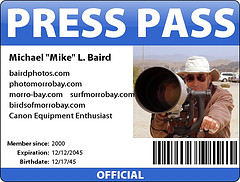
Oregon town Lake Oswego is seeking to legally define who is a journalist. Will journalists start toting press badges and hats?(Credit: Flickr, "mikebaird")
A city in Oregon is trying to legally define who is a journalist, the Knight Center for Journalism in the Americas reported.
“The effort to define what constitutes a journalist stems from an Oregon open meeting law that allows only journalists, and not the public, to attend executive sessions of the city council,” the center reported, citing articles by the Portland Mercury and the Lake Oswego Review.
The law allows city council to meet in private–with the exception of journalists’ presence–and talk “off record.” Under this law, “Even journalists can’t directly report on what happens in the session.”
The Portland Mercury explained that Lake Oswego’s city attorney created a requirement that journalists have to be part of the “institutionalized’ media” in order to be considered a journalist. According to Lake Oswego’s website, the city has a population of about 36,000 people.
Under that law, a blogger, Mark Bunster, was “kicked…out of one of their executive sessions” two years ago. As the Lake Oswego Review explained, Bunster, a member of the Society of Professional Journalists, was asked to leave because officials “said his lack of institutional affiliation made it impossible to penalize him if he failed to respect or understand the law.”
The Lake Oswego Review highlighted the policy’s definition of media, created by Lake Oswego city attorney David Powell.
Some of the guidelines include:
- A blogger can be included “As long as he is a part of an institution and committed to compliance with the law.”
- Media is “any organization that has been previously recognized as eligible to attend executive sessions.”
- Members of two Oregon media organizations — the Oregon Newspaper Publishers Association and theOregon Association of Broadcasters — and the Associated Press are allowed.
- “Non-traditional media” must pass a “two-part test” including regular publication and institutionalization (defined as having “multiple personnel” and a methodology for corrections)
See more of the guidelines here.
Also, according to the Portland Tribune, the city council could waive the policy on a case-by-case basis and bans the media from using any cameras or recordings during sessions.







Comments Terms and Conditions